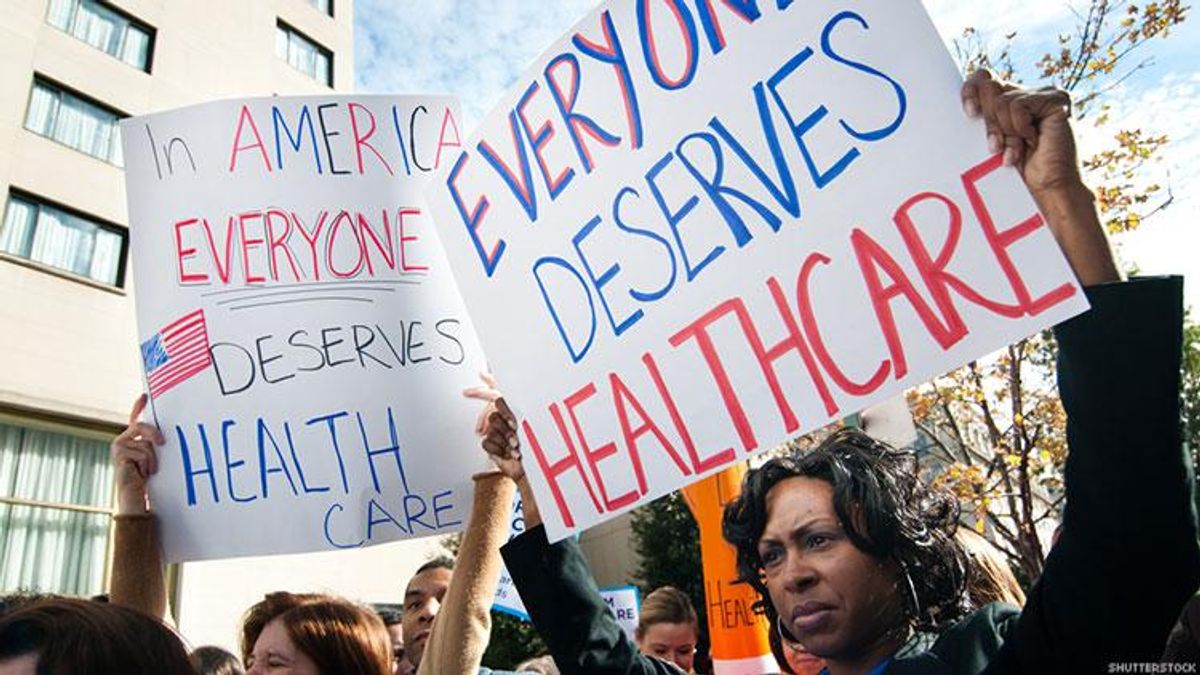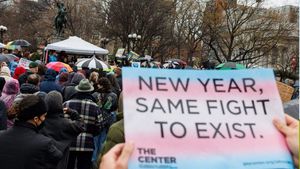On a sweltering July day in 2017, I was one of 80 protesters arrested on Capitol Hill, handcuffed and left to sweat in the back of a windowless van for hours before spending several more hours in a hard chair, still handcuffed, in a stuffy warehouse waiting to be processed.
As a police officer went through the release paperwork with me, he asked me about our protest.
“Congress is trying to take away health care from millions of low-income people and people with pre-existing conditions,” I explained. “People will die. We have to do something.”
Eighteen days later, the late Senator John McCain famously gave the thumbs-down sign and, along with Senators Susan Collins and Lisa Murkowski, denied Senate Majority Leader Mitch McConnell the votes he needed to strip health care from those who needed it most.
After three unsuccessful attempts to repeal the Affordable Care Act (ACA) that year, it looked like we might be able to breathe again for a while. Turns out, taking away people’s health care is not actually the crowd-pleaser Republicans had counted on.
So instead of continuing to take unpopular votes, they decided to let the courts do their dirty work for them.
In February 2018, a group of Republican state attorneys general and governors filed suit in a Texas district court arguing that the ACA is unconstitutional. Unsurprisingly, the Trump Administration eventually agreed and refused to defend the law in court. In December 2018, we got the worst holiday present in recent memory: the district court ruled that the ACA was unconstitutional in its entirety.
Last week, again in time for the holidays, there was another blow. Rather than protecting health care for millions, a three-judge panel at the Fifth Circuit Court of Appeals struck down the individual mandate — one of the pillars of the ACA. In a preposterous turn of events, the panel sent the case back down to the district court judge who ruled the entire law unconstitutional a year ago! That district court will now get to decide if the ACA can stand without the mandate.
Once again, millions of Americans’ right to health care hangs in the balance. Their coverage remains in place today, but the fate of the ACA will almost certainly be headed to the most hostile Supreme Court in decades. Unlike Senators, Supreme Court justices cannot be voted off the bench. The Right has us just where they want us: in their crosshairs.
As communications director for Positive Women’s Network – USA (PWN), an advocacy organization of women and people of trans experience living with HIV, the overwhelming majority of whom live below the federal poverty level, I know how important — and incomplete — the protections of the ACA are.
Over the past four years, I have built relationships with and helped lift up the voices of hundreds of thriving, talented women whose lives were thrown for a loop by an HIV diagnosis — and who have managed to rise above persistent stigma and discrimination to advocate for fairness, equity, and human rights. Many were unable to get insurance before the ACA. Many have been forced into poverty in order to qualify for Medicaid — their only way to be able to afford the health care they need to live. Still others have depended solely on Ryan White and the AIDS Drug Assistance Program (ADAP) to get the antiretrovirals they depend on to keep the virus controlled, but have had little or no coverage for other health conditions.
While PWN’s policy agenda is broad, no single issue has mobilized PWN members and allies like health care access. When you live with a chronic condition like HIV, health care is simply not negotiable: it is literally life or death. That’s why PWN members flocked to Washington, D.C., over and over, rallied outside their Senators’ district offices, made thousands of phone calls, and even held “empty-seat” town halls in 2017.
As HIV activists know well, silence equals death — and PWN members are not the silent types.
Elections have consequences. Those elected to the Senate and the White House have control not only over legislation, but also over judges who make decisions that can alter the course of our lives — or even end our lives. President Trump and Senator McConnell have packed the courts with ultraconservative, young, white men who now have lifetime appointments to decide what happens to the rest of us. We cannot sit idly by.
PWN is deeply invested in educating, organizing, and mobilizing communities far too often left out of traditional political get-out-the-vote efforts to make sure our folks are registered to vote, know what’s at stake, know what questions to ask, know how to hold leaders accountable, and vote up and down the ballot. That’s why we launched Organizing for Power: Road to 2020 this year, building and supporting teams led by people with HIV in ten states to lead integrated voter engagement in their communities in the 2020 election cycle.
The Supreme Court will not likely rule on the Texas v. United States case until after next November’s election. It is up to us to make sure people are aware of this imminent threat to the very lives of millions of Americans. It is up to us to push our elected leaders to take legislative action to enshrine universal health care into law, like every other developed nation in the world. It is up to us to hold our leaders accountable to making sure that no one in the U.S. dies simply because they could not afford the health care they needed to survive.
PWN was fierce in 2017. Just wait till you see us in 2020.
This article was written by Jennie Smith-Camejo, communications director for Positive Women’s Network – USA. Smith-Camejo lives in Miami, Fla.








































































